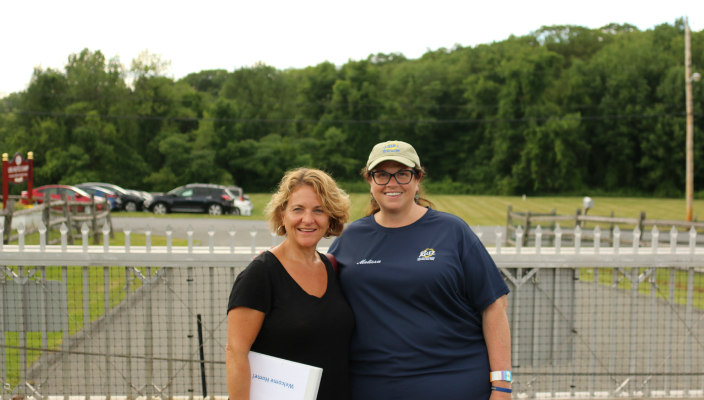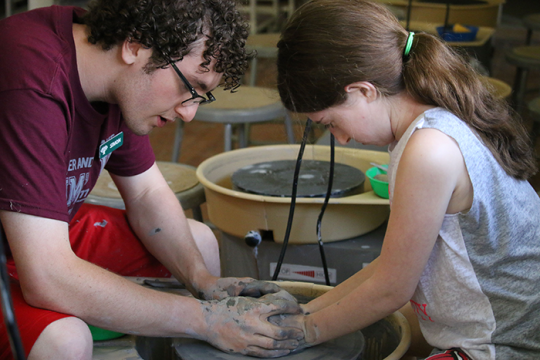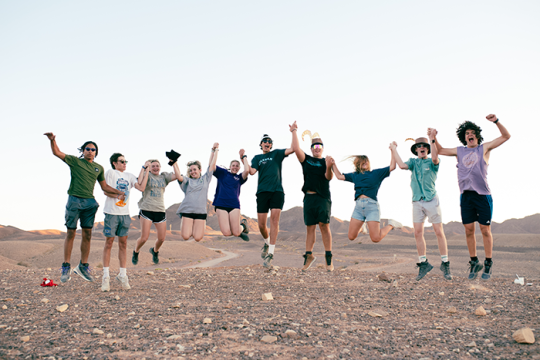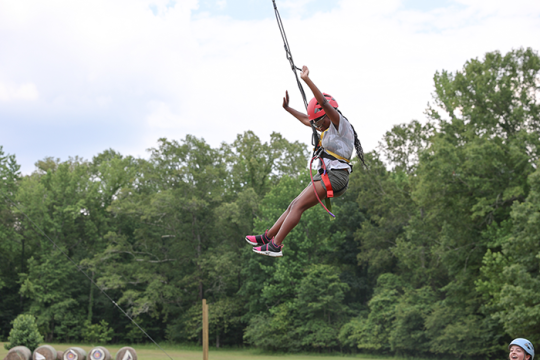
Last week, staff at URJ Kutz Camp had the chance to sit down with Julie Lerner for a short interview. Julie Lerner is the newly appointed executive vice president of the Union for Reform Judaism, assigned with bringing continuity to all the efforts our movement produces to move as a more autonomous body. This marked the first time Julie had ever been to the URJ Kutz Camp, and we wanted to capture her first impressions.
Kutz: Julie, thank you so much for taking time to talk with us today. I’d love it if you could start by introducing yourself and speaking a little about your new role at the URJ.
Julie: My name is Julie Lerner, and I’m in a new role at the URJ and excited to be in that role as executive vice president. The role was created in an effort to build on all the success at the URJ to date by bringing the pieces together in a new and exciting way where collaboration was the focus and connecting the dots between all of our work was the intent to help us grow even stronger in years ahead.
Since collaboration is such a quintessential part of your job, could you share a little with us about what the value of partnership is to you?
You know, partnerships are so important to me. I’ve spent my career and my life in bringing folks together to work on things together, and to me partnerships are about representing different points of view in a conversation in order to come to a better conclusion than any one person would do individually. So, partnerships are, to me, at the core of success for any organization, and they certainly are key to my success as an individual throughout my career, and I hope they would be for others as well as they move forward.
One of the things I think is so special about our camping system is the partnership opportunities that arise within the isolated communities. Do you have a connection to camping?
So, camping is so fascinating to me because it is the essence of community, and community that’s often built in a very short time period. You walk into a camp - like I have at Kutz today - and I see people who only after only a few days really feel like they’re a family in part, and they really feel together. They’re working together successfully. They’re bouncing ideas off of each other.
I had an opportunity to sit with the leadership team when I first got here and hear the conversation, and I was so impressed by the level of dialogue and the collaborative spirit with which the conversation was held. So, I think partnerships are about being able to generate great thinking and doing it in a way where people feel supported and feel part of the community that is really reflected at camp.
And Julie, I had also heard that this is your first time on camp.
That is correct.
Could you share with us some of your first impressions?
Yeah, I’ve seen so much in such a short time. I’ve seen the lovely landscape, which certainly - I think - helps to build community. I’ve seen such intentionality here around inclusion and diversity, and that is something I’d like to be able to spend more time thinking about and looking at at Kutz and at the other camps of the URJ. We really, we talk about audacious hospitality and from the moment I walked into the facility, to what I saw with the many members of the community, we really speak audacious hospitality, but more importantly we live it here.
I also noticed some really cool programming. I’m not - any longer - of a camper’s age but I would love to be a camper in this program. It was a really cool combination of opportunity for teens to talk about things that they live with day-in and day-out. So, whether it’s issues that they hear about or are important to them in the community, whether it was around looking at how politics is being discussed through the comedy on late night TV, or whether it was looking at how spirituality can be reflected through Jewish practice, there’s so much that was available to teens to help them lead a fuller life now, and also to prepare them as leaders as they move into the future - both in college and beyond.
Awesome, and can you share with us a little bit about your own community?
I’m happy to. I’ve recently relocated to the New York area from Washington, D.C. I have a husband and two grown daughters, and I myself was raised in the Conservative Movement outside of Philadelphia. However, when we joined a congregation in Northern Virginia, we were pleased to join Temple B’nai Shalom with Rabbi Amy Perlin and to be able to offer our daughters an opportunity to be exposed to Reform Judaism. Both my husband and I, as I said, did grow up in the Conservative Movement, and one of the things that was always so appealing about Reform Judaism was the progressive nature of the movement and the opportunity to really be involved in a community that lived the values that we believed in.
Now, how about some of our go-to mixer questions?
Sounds good to me.
We’ll start with some basic ones. What’s your favorite color?
My favorite color’s purple.
OK. What’s your Starbucks order?
Dark coffee, black.
Relatable!
It’s easier to get in fast that way.
Of course. And if you could be any isle in the grocery store, what aisle would you be?
Oh, I’d have to go with produce… that’s a good question. I have to remember that one.
Glad we could leave you with some solid takeaways.
*laughs*
Related Posts

Embracing Jewish Identity, Learning to Lead: The Lifelong Benefits of Working at Summer Camp

Empowering Tomorrow: The Enduring Impact of Youth & Teens in Reform Judaism's 150-Year Journey
